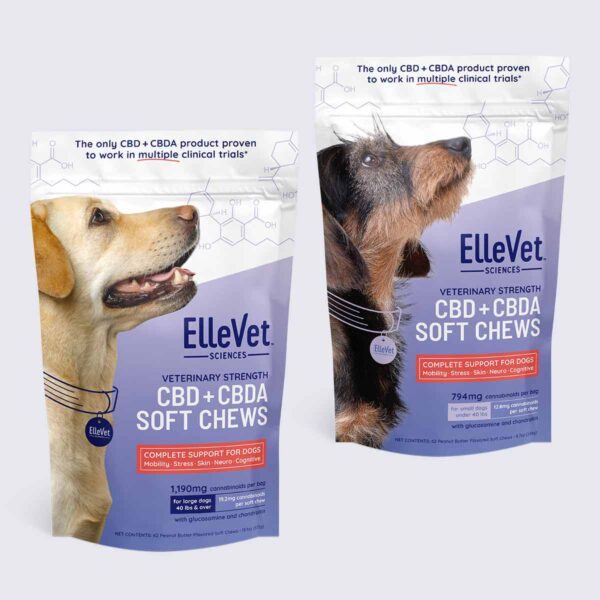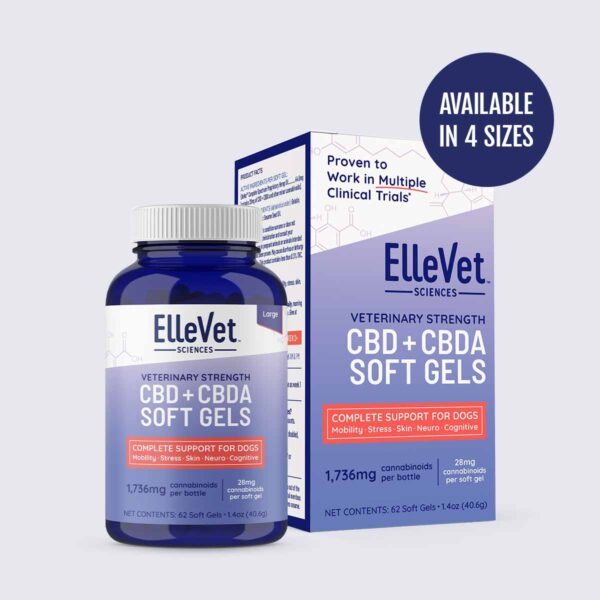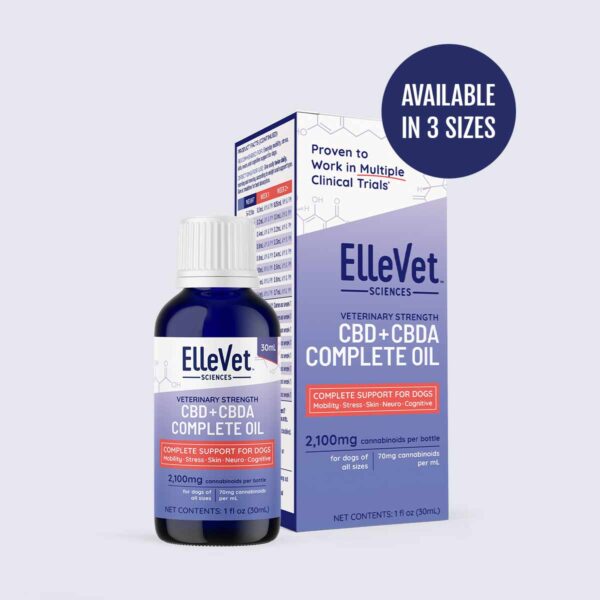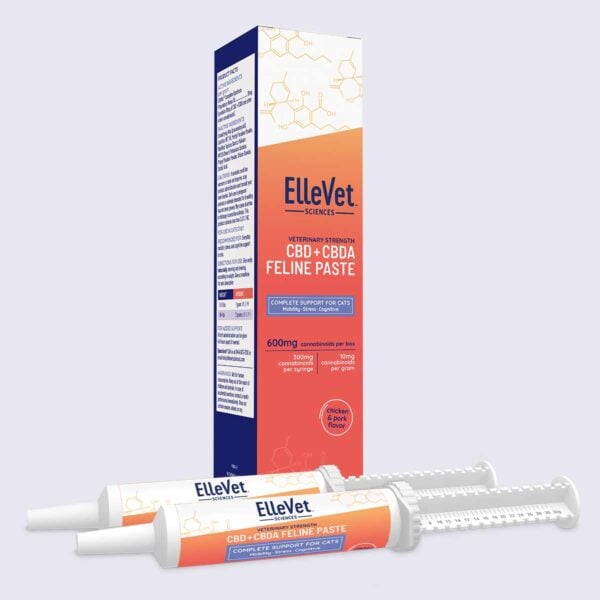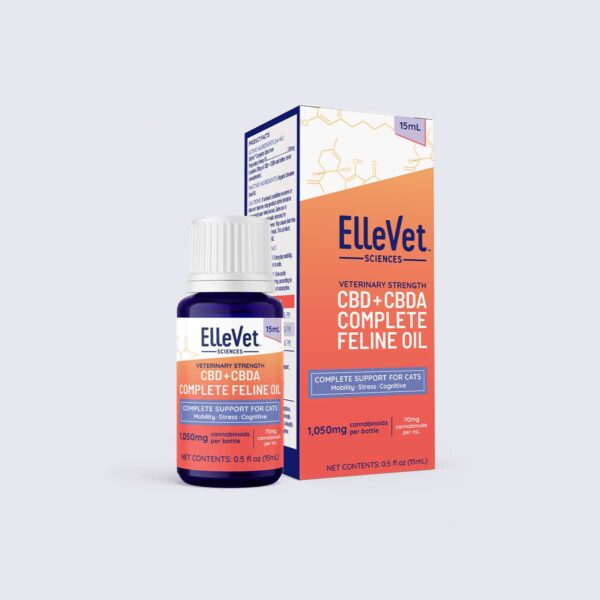CBD is seemingly everywhere you look. In such a new industry, it can be difficult to understand what exactly you should be looking for. When shopping for a CBD product, you will likely see CBD oil products for dogs labeled and marketed in one of the following ways:
- Hemp Oil
- Hemp Seed Oil
- Hemp Extract
- CBD Oil
- Full Spectrum CBD Oil
- Broad Spectrum CBD Oil
- Complete Spectrum CBD Oil
- CBD Isolate
A number of these labels may be accompanied by a picture of a marijuana leaf or something of that nature (which is inaccurate and further adds to the confusion of what is actually in the product). With all of these different terms listed, how do you choose? And what do they mean? Let’s go through the important differences between these different products and labels.
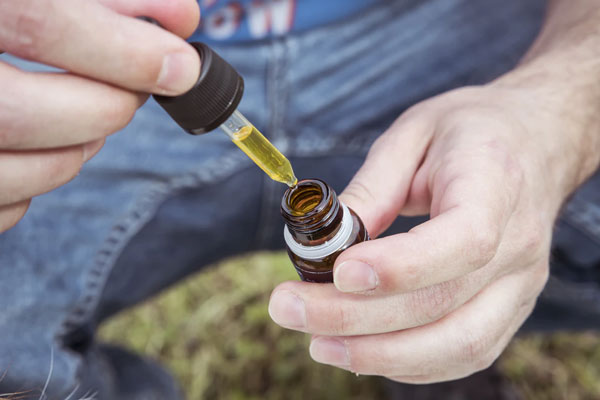
Hemp Oil vs. CBD Oil
CBD oil and hemp oil are vastly different things, so, what is CBD oil?
If a product is truly CBD oil, it is (or should be) extracted using the entire hemp plant (the stalks, the leaves, and the flowers). Ultimately, this gives the product a far higher concentration of CBD, thus will be most effective. A true CBD oil should contain no GMO’s or additives.
Hemp oil, which may also be labeled as “hemp seed oil” or “hemp extract”, on the other hand, is extracted using only the seeds of a hemp plant. Hemp oil and hemp seed oil actually contain no CBD at all. While hemp oil may have its applications in the human healthcare industry, it should not be perceived as CBD, nor should it be expected to address the same concerns and ailments that CBD can.
Whether it is ignorance or deceit, companies will often market hemp oil and CBD oil as if they are same thing. As an informed buyer, it is important to understand the difference.
Full-Spectrum CBD Oil vs. CBD Isolate
Other terms you may come across when looking at products, are “full-spectrum CBD oil”, “broad-spectrum CBD oil”, “complete-spectrum CBD oil” and “CBD isolate”. While all contain CBD, full-spectrum CBD oil and complete spectrum CBD oil are the preferred products in regards to effectiveness.
CBD isolate simply means when the CBD and hundreds of other cannabinoids are extracted from the hemp plant, the CBD cannabinoid is then isolated from the other cannabinoids, terpenes, and flavonoids found in the plant. As a result, you are left with solely CBD. While this may sound like a positive thing, it actually makes the CBD less effective. When removed and isolated from its naturally occurring compounds (terpenes, flavonoids, cannabinoids), the CBD is unable to take the effect that it otherwise would.
In contrast, full-spectrum CBD and complete-spectrum CBD include all of the cannabinoids, terpenes, and flavonoids naturally found within the hemp plant. Together, these properties of the plant form an “entourage effect”, working together (as intended) to make for a more effective product. Without the naturally occurring terpenes and flavonoids, the CBD cannabinoid will not be as effective (and visa versa).
Broad-spectrum CBD includes mostly all of the cannabinoids, terpenes, and flavonoids found within the hemp plant. However, these compounds are then altered. If a certain cannabinoid, terpene, or flavonoid has been altered or removed during extraction in any way, this would constitute a “broad-spectrum” CBD product.

Comparing Cost – Is it Worth it?
While browsing CBD oil for dogs, you will experience a wide range of prices. CBD oil can be priced anywhere from $20 to $250 a bottle. So, how do you know which is worth the cost?
Bottles will be labeled using milliliters (mL) and milligrams (mg). The milliliters refer to the amount of oil in the bottle, while milligrams refer to how much CBD is in the bottle. An example would be: this 20mL bottle of CBD oil includes 100mg of hemp CBD.
While some companies will be sure to emphasize the amount of CBD in the bottle, they will not be as forthcoming as to what that actually means. To calculate how much CBD is in the product you use, simply take the milligrams listed, and divide by the milliliters listed (100mg/20mL = 5mg per mL). If you have purchased the bottle we used in the example (20mL/100mg) for $50, that means there is only 5mg of CBD per mL. It does not mean there is 100mg of CBD per dose.
Let’s say you have a 70lb (31kg) dog, and you are using a recommended dose of 1mg of CBD oil per kg of body weight, twice a day. This means you would need to use 6mLs of the bottle, twice a day, in order to reach an effective dose of CBD for your pet. You would go through the entire bottle in less than 2 days. Meaning, with proper dosing for this product, you would need to spend $50 every 2 days.
ElleVet Sciences’ oil has a potency of 50mg per mL. A 20mL bottle of ElleVet retails at $90 per bottle, and contains 1000mg of complete-spectrum CBD. If we use the same 70lb dog as an example, this bottle (using the same dosing), would last you more than 10 times longer than the bottle you just spent $50 dollars on. This is made clear by using the equation we just learned to use when determining the amount of CBD in a bottle. (1000mg/20mL = 50mg per mL)
While the less expensive $50 bottle may be appealing to your wallet and seem cost-effective at the time, proceed with caution, because it is likely the exact opposite. It may save you $40 at the moment, but in reality, it is costing you hundreds, even thousands in the long run. More importantly, it is not helping your pet, because there is not nearly enough CBD in the product.

Important Questions to Ask
As mentioned earlier, CBD is seemingly everywhere you look. There is an abundance of CBD companies in the animal health industry, all claiming their product is superior to others. While it is safe to assume the “CBD” you see at the gas station is not of the highest quality, here are some more helpful questions to ask before making your buying decision:
Ask for a COA – “COA” is an acronym, standing for Certificate of Analysis. If you are speaking to a reputable company, a COA should be available upon request. In short, a COA shows you exactly what the product contains. If the product is tested as frequently as it should be, the company should have a COA for each lot, and each bottle produced. If the company you are interested in trying for your pet is hesitant or unwilling to produce a COA, that should raise a cautionary flag.
Is the product 3rd party lab tested? – While in-house testing is an important aspect of any company producing a healthcare supplement, it is even more important that the product is tested and analyzed through a neutral, unbiased lab for full transparency.
Are there published studies available? – ElleVet Sciences sets the standard in the CBD industry in the animal health space. It is the only product that has a published clinical trial, completed at Cornell University in 2017, and officially published in 2018. This is absolutely critical, especially in a space that the FDA does not yet regulate. Companies will make numerous claims about how their product(s) will help your pet(s), very few companies have those claims backed by scientific evidence. The complete study at Cornell University can be found here.
Is it trusted and endorsed by veterinarians? – Again, due to the concrete scientific evidence and safety study, ElleVet Sciences is one of the only products trusted and carried by veterinarians. As is the case with any medication, always consult your veterinarian before trying a product for your pet.

